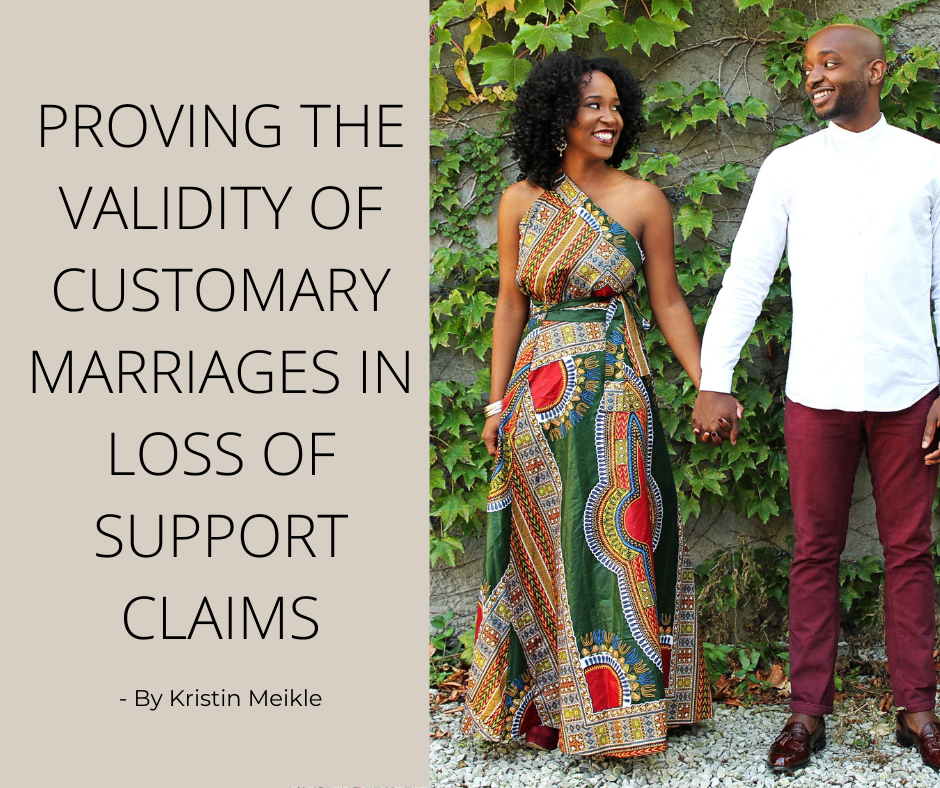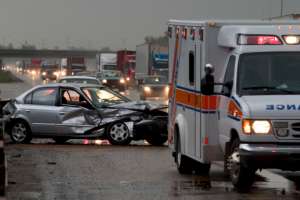Authors – Kristin Meikle
THE ONEROUS TASK OF PROVING THE VALIDITY OF CUSTOMARY MARRIAGES IN LOSS OF SUPPORT CLAIMS AGAINST THE ROAD ACCIDENT FUND
Evidencing the conclusion of a valid customary marriage and the existence of concomitant rights and duties of such customary spouses remains an onerous task on part of the Plaintiff – notwithstanding the judicial recognition of living customary law and certain provisions of the Recognition of Customary Marriages Act 120 of 1998 (RCMA).
To understand the complexities of proving the validity of customary marriage in claims against the RAF one ought to first touch base with the notions underpinning customary law in South Africa.
Customary law is living, dynamic and diverse, and the requirements for a validly concluded union vary between ethnic groups and their respective practices. However, the RCMA seeks to consolidate and / or regulate the interface between the spectrum of ‘living’ customary marriage laws by creating ‘official’ customary law and thereby specifying formal legal requirements for the validity of a customary marriage whilst maintaining the notions of equality and cultural integrity.
Accordingly, section 3(1)(a) and (b) of the RCMA stipulates that a customary marriage is validly concluded where the prospective spouses were consenting majors and the marriage was negotiated and entered into or celebrated in accordance with [any] customary law. In instances where the prospective spouses are minors, section 3(2) of the RCMA stipulates that the consent from both respective parent(s) or legal guardian(s) of such prospective minor spouse’s ought to be obtained and where this is impossible, the written consent of a commissioner of child welfare may be acquired.[1]
In light of the above stated requirements, the issue brought to the fore in this article is not relative to the requirements themselves, but rather the evidentiary burden and the challenges faced by widowed spouses in proving that these requirements were in fact satisfied such that it can be said that the spouses shared reciprocal duties of support throughout the subsistence of their customary marriage.
Section 4(9) of the RCMA states that the failure to register a customary marriage does not affect the validity of that marriage. However, it is not uncommon for the validity of such a marriage to be an issue in dispute, owing to the Defendant’s demand for
de facto (real, written, and official) proof in the form of a .[2] Where this is impossible to produce, there exists no prima facie evidence of the customary marriage.[3] The Plaintiff is thus required to prove that the requirements in terms of section 3 of the RCMA were met. Section 3, however, has been criticised by the judiciary as being vague and compounded by the fact that some customary and cultural practices within the different communities are heterogeneous.[4]
Thus, it can be said that the RCMA fails to adequately address the requirements of proving the validity of a customary marriage insofar as the evidencing of consent, negotiations, and celebrations in accordance with the applicable living customary law in question is concerned.
The Plaintiff in his / her claim for loss of support against the RAF will therefore have to prove on a balance of probabilities that he / she complied with section 3 of the RCMA. This can be done by substantiating his / her claim through proof of lobola negotiations and / or subsequent payment, proof of the handing over of the bride to the grooms family and / or proof of celebration, which are seen as additional requirements to the conclusion of a valid customary marriage in accordance with living customary law.[5] It is common practice that witness affidavits and testimony may be used in support of these contentions – and in such instances the court must come to a conclusion on, inter alia, the credibility, reliability, probabilities and veracity of such witnesses.[6]
Although the above-stated evidentiary material may be used by the plaintiff in support of his / her claim, the Supreme Court of Appeal noted in Mbungela and Another v Mkabi and Others that the provisions in section 3 of the RCMA do not restrict parties to a specific list of requirements that ought to be complied with for a valid customary marriage to exist, but rather, the court must consider the flexibility of the customary law systems as well as the present practices and lived experiences of the communities and customs concerned.[7]
In conclusion, section 3 of the RCMA need not be seen as restricting official customary law, but rather it should be understood within the context of living customary law. In accepting and scrutinising the aforementioned evidentiary material, the author posits that the Plaintiff will not be precluded from bringing a claim for loss of support, in terms of section 17 of the Road Accident Fund Act 56 of 1996. Furthermore, and respecting living customary law whilst remaining faithful to the Constitutional bedrock of equality and non-prejudice based on marital status and culture.
[1] See Section 25 of the Marriage Act 25 of 1961.
[2] The existence and proof of customary marriages for purposes of Road Accident Fund Claims – IP Maithufi & JC Bekker 174 Obiter 2009.
[3] Recognition of Customary Marriages Act 120 of 1998, Section 4(8).
[4] Motsoatsoa v Roro and Others (46316/09) [2010] ZAGPJHC 122; [2011] 2 All SA 324 (GSJ) (1 November 2010) at para 10 and 11.
[5] Maithufi I.P. and Bekker J.C., Recognition of Customary Marriages Act 1998 and its Impact on Family Law in South Africa CILSA 182 (2002). See also: Nthejane and Another v Road Accident Fund (3183/2010) [2011] ZAFSHC 196 (1 December 2011); Mabuza v Mbatha (1939/01) [2002] ZAWCHC 11; 2003 (4) SA 218 (C); 2003 (7) BCLR 743 (C) (4 March 2003) and; M v Road Accident Fund (28602/2017) [2020] ZAGPPHC 63 (18 February 2020).
[6] Stellenbosch Farmers’ Winery Group Ltd. and Another v Martell & Cie SA and Others (427/01) [2002] ZASCA 98 (6 September 2002) at para 5. See also: M v Road Accident Fund (28602/2017) [2020] ZAGPPHC 63 (18 February 2020) at para 18 – 26.
[7] (820/2018) [2019] ZASCA 134; 2020 (1) SA 41 (SCA); [2020] 1 All SA 42 (SCA) (30 September 2019) at para 17.



